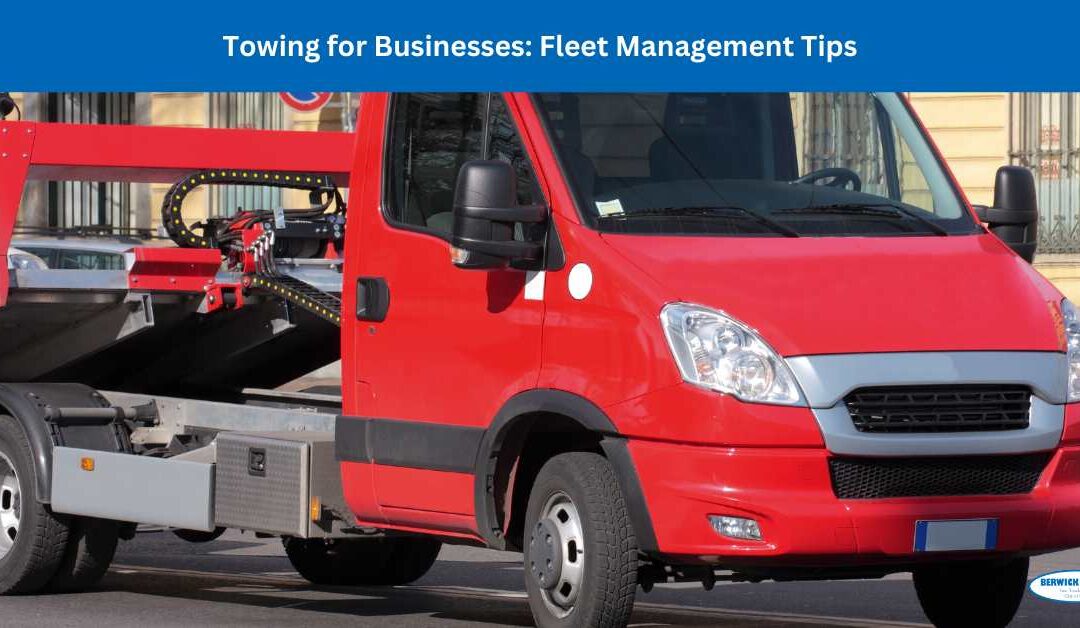Managing a fleet of towing vehicles requires careful planning, maintenance, and organization to ensure efficiency, reduce costs, and improve service quality. A well-maintained towing fleet is essential for timely responses, safe towing practices, and overall business success. Here are some crucial tips for effective fleet management tailored to towing businesses.
1. Prioritize Regular Vehicle Maintenance
Routine maintenance keeps your fleet in optimal condition, minimizes breakdowns, and extends the lifespan of each vehicle.
- Scheduled Maintenance: Develop a calendar for maintenance checks, including oil changes, brake inspections, and tire rotations. Stick to this schedule to prevent unexpected breakdowns.
- Engine Health: Regularly check engine fluids, belts, and hoses. Towing puts extra strain on engines, so monitoring wear and tear can prevent costly repairs.
- Brake and Suspension Systems: The added weight of towing requires reliable brakes and sturdy suspension. Include frequent checks of brake pads, rotors, shocks, and struts to ensure safe towing.
- Transmission Monitoring: Towing puts stress on the transmission. Keep transmission fluid levels in check and consider installing transmission coolers to avoid overheating.
2. Invest in Fleet Management Software
Fleet management software can streamline operations, provide data insights, and optimize vehicle usage.
- Vehicle Tracking: Use GPS tracking to monitor vehicle locations, driver routes, and dispatch times. Real-time tracking helps optimize routes and improves customer service.
- Maintenance Alerts: Set up automated alerts for regular maintenance, inspections, and repairs. This feature helps prevent vehicle downtime and ensures fleet readiness.
- Data Analytics: Collect data on fuel consumption, trip distances, driver behavior, and vehicle usage. Analyzing this data helps you reduce operational costs and improve overall efficiency.
- Digital Logs: Replace paper logs with digital records of repairs, inspections, and incidents. Digital documentation ensures accuracy and easy access to historical data.
3. Optimize Fuel Efficiency
Fuel is a significant cost in any towing business, and managing fuel efficiency helps control expenses.
- Route Planning: Use fleet management software or GPS systems to find the most efficient routes, reducing travel time and fuel usage.
- Driver Training: Train drivers on fuel-efficient driving techniques, such as avoiding rapid acceleration and maintaining steady speeds.
- Reduce Idling: Limit idling time by reminding drivers to turn off engines when waiting. Idling wastes fuel and adds unnecessary wear to engines.
- Regular Tune-Ups: Maintain engines and keep tires inflated to their recommended pressure to maximize fuel efficiency.
4. Maintain Safety and Compliance Standards
Safety is paramount in towing operations, and compliance with local and federal regulations ensures your business operates legally and safely.
- Driver Safety Training: Provide ongoing training for safe driving, towing practices, and proper use of towing equipment. Emphasize safe loading and unloading procedures.
- DOT Compliance: Ensure all vehicles meet Department of Transportation (DOT) requirements, including weight limits, trailer hitch specifications, and safety equipment.
- Inspections: Regularly inspect towing gear, chains, lights, and brakes to prevent accidents. Keep records of inspections for legal compliance.
- Insurance and Licensing: Keep insurance policies and driver licenses up-to-date to meet regulatory requirements and protect your business in case of accidents.
5. Manage Fleet Replacement Cycles
Replacing vehicles on time keeps your fleet modern, reliable, and cost-efficient.
- Assess Lifespan and Mileage: Track vehicle mileage and assess repair frequency. Older vehicles with high mileage typically require more maintenance and can impact productivity.
- Budget for Replacement: Plan your fleet budget to include vehicle replacement costs every few years, depending on usage and wear.
- Consider Fuel Efficiency and Technology: Invest in newer models that offer better fuel efficiency and upgraded safety features, such as collision avoidance or lane departure warnings, which can improve driver safety.
- Sell or Repurpose Old Vehicles: When it’s time to retire a vehicle, consider selling it or repurposing it for lighter use if it’s still in working condition.
6. Enhance Customer Service and Response Times
An efficient fleet can significantly improve response times, which is essential in the towing industry.
- Strategic Vehicle Positioning: Position vehicles across service areas based on demand to minimize response times. Using historical data can help identify high-demand zones.
- 24/7 Dispatch System: Ensure your dispatch system operates 24/7 for fast response. Fleet management software can help automate dispatching and improve scheduling.
- Vehicle Readiness: Maintain a “ready-to-go” policy, ensuring vehicles are fueled, cleaned, and stocked with necessary equipment. This reduces downtime between calls.
7. Equip Vehicles with Essential Towing Gear
Outfitting your fleet with high-quality towing gear ensures vehicles are ready to handle any situation safely.
- Standard Towing Equipment: Each vehicle should have quality tow chains, winches, straps, and hooks. Regularly inspect and replace worn or damaged equipment.
- Safety Gear: Equip vehicles with safety cones, reflective vests, emergency lights, and hazard signs for on-the-road safety.
- Versatile Towing Options: For added flexibility, equip your fleet with both flatbed and wheel-lift towing capabilities. This allows your business to handle a wider range of vehicles.
- First-Aid and Emergency Kits: Stock each vehicle with a first-aid kit, fire extinguisher, and basic tools for emergency roadside assistance.
8. Driver Management and Training
Your drivers are the face of your business, and their training and behavior impact service quality and safety.
- Hiring Qualified Drivers: Look for drivers with previous towing experience and a clean driving record. A background check and reference verification can help ensure quality hires.
- Continuous Training: Provide drivers with regular training on towing techniques, customer service, and fleet management software. Training reduces mistakes and increases efficiency.
- Monitor Driver Behavior: Use telematics to track driving habits like speeding, hard braking, and excessive idling. Reward safe drivers and provide coaching for improvement where needed.
- Driver Health and Wellness: Encourage healthy practices and allow for adequate breaks, as fatigue can lead to errors and accidents.
9. Track and Control Operational Costs
Effective cost control is essential for a profitable towing business, and monitoring operational expenses can reveal areas for improvement.
- Maintenance Costs: Track repair and maintenance costs to identify vehicles that may need replacement. Regularly review expenses to find patterns or issues.
- Fuel Expenses: Monitor fuel usage per vehicle and driver, aiming for improvement through efficient routes and driving practices.
- Overhead Costs: Regularly assess your budget for insurance, salaries, maintenance, and software to identify areas where costs can be reduced without compromising quality.
- Asset Utilization: Ensure each vehicle is being used effectively. Underutilized assets add to operational costs without generating revenue.
10. Establish Emergency Protocols
Emergency preparedness helps your fleet handle unexpected breakdowns or accidents efficiently and safely.
- Breakdown Procedures: Train drivers on breakdown protocols, including contacting dispatch, using hazard lights, and safely positioning the vehicle.
- Backup Vehicles: Maintain a few extra vehicles in the fleet as backups to replace any vehicle out for repairs or maintenance.
- Accident Response: Equip drivers with emergency contact information, accident reporting forms, and instructions for securing the area.
- Roadside Assistance Partnerships: Establish relationships with roadside assistance providers to support drivers in case of vehicle failure or complex towing situations.
Conclusion
Effective fleet management in a towing business involves a balance of regular maintenance, cost control, driver training, and strategic planning. By focusing on safety, efficiency, and customer service, you can build a reliable, responsive fleet that contributes to business growth and customer satisfaction.
If you are in Berwick, Victoria 3806, Australia, and looking for a car removal service, this is the best way to visit us.
Contact Us
Berwick Towing & Transport
27B William Rd
Berwick VIC 3806
(03) 7035 7815
www..berwick-towing.com.au/

